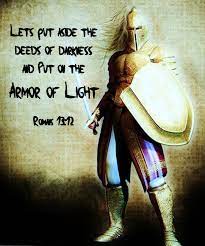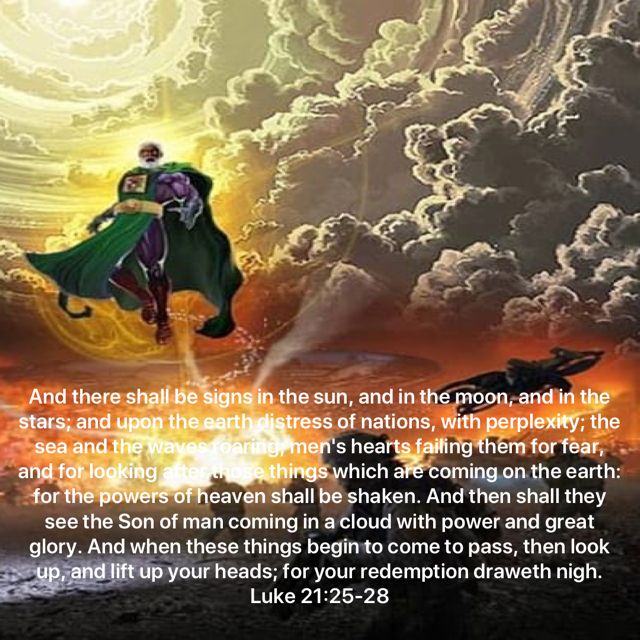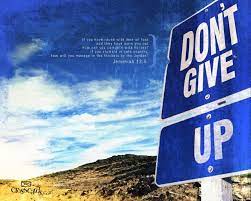
I am sure that many of you feel like I do about Easter. I love Easter -- the triumphal notes of the music, the joy it expresses. I love the hope for which Easter stands, and even the time of year in which it comes, with the beauty of the springtime flowers around us. I always look forward to Easter. Even though I have sung the hymns nine times over this morning, I still love and enjoy them. But I never go through an Easter without feeling, at the end of each year, that something has been missing. Some great truth has remained unexpressed. Somehow or other we focus on some of the great and well-known themes of Easter and miss this one which, in many ways, I think, is the greatest note of all in the Easter Message:
I rejoice with you in singing that Jesus is alive again. The very thought that he survived the grave, that he came back from death, is an encouraging thought, and we rightly celebrate that all through this Easter season. And I rejoice with you that we therefore have a hope beyond the grave, that when we come to the end of life and stand at the river of death, we can hear Jesus' words, "Because I live, you shall live also," (John 14:19). We can cry with the Apostle Paul, "O death, where is your sting? O grave, where is your victory?" (1 Corinthians 15:55 KJV). That is part of the triumphant message of Easter. I rejoice also that truth will surely live; that evil will not triumph ultimately, but God's goodness and truth shall reign throughout the earth. But it seems to me that the true glory of this Easter message, the greatest message that this day can have for us, is to remind us that in the risen Lord Jesus we have an endless supply of power to love. That is what Easter is all about -- the fact that we have an ability to love. Love is the greatest need of the world today. I don't think I have to argue that point with you.

When Paul wrote this letter to the Romans in the capital city of the Roman Empire, surely love was the thing that was most lacking in that empire. These people, under the subjugation of a military machine and a cruel, relentless emperor, needed desperately to learn how to love and how to display love amidst the pressure and oppression of that day. This was what was needed in the city of Corinth, with all its immoral sexual practices and its abandonment to pleasure, the city from which Paul wrote the letter to the Romans. In the midst of seeking after merriment and pleasure the Corinthians needed to learn the gift of love. Love is what is needed in Palo Alto, Menlo Park, Mountain View, Los Altos, and Sunnyvale, all up and down the Peninsula, across the Bay, across the country, and around the world. The greatest need of men anywhere today is to learn the secret of how to love. Love would make a difference. Listen to what Paul says to these Romans in Chapter 13, Verses 8-10:
Let no debt remain outstanding, except the continuing debt to love one another, for he who loves his fellow man has fulfilled the law. The commandments, "Do not commit adultery," "Do not murder," "Do not steal," "Do not covet," and whatever other commandment there may be, are summed up in this one rule: "Love your neighbor as yourself." Love does no harm to its neighbor. Therefore love is the fulfillment of the law. (Romans 13:8-10 NIV)
Have you ever struggled to obey the Ten Commandments? Have you found it difficult to face up to obeying these demands that you shall not murder or lie or steal or commit adultery? Well, Paul says it is really easy. All you have to do is love. Act in love toward people and you won't hurt them. You can't. The solution to all the problems we struggle with is this one thing. Have you ever thought of what would happen in this world if people could be taught how to love -- and then they did it?
The first result that occurs to me is that all the impending divorces would be happily resolved. Couples ready to split up because love has left their marriage could go back together and learn how to work it out. It wouldn't automatically solve all their problems, but it would make possible their solution. And think what would happen if all the divorces that this country is facing today would suddenly cease to be, and homes and families would be secure. What a tremendous thing that would be in this country!
If we could teach people how to love we wouldn't fight in wars. We wouldn't have to worry about disarmament. We could send the atom bombs and nuclear explosives and missiles off into space somewhere and let them join the rest of the space garbage. What a remarkable thing that would be! Think of how much energy and money is being expended in keeping up this endless array of armaments simply because we can't trust people to love each other. That is the whole problem.
If we could love each other, there wouldn't be any more crime. The streets of San Francisco would be safe to walk once more, and in all the great cities of our land you would feel safe and secure -- if people would learn to love. Of course, if there weren't any crime, you wouldn't need any prisons. All the money we spend on prisons and reformatories could be spent on something more useful. And you wouldn't need any courts of law, or police -- except to regulate traffic a little bit now and then. We need all these things because we are so deprived in this ability to love. And think what would happen to our tax burden if we could get rid of all wars and crimes and police and courts! It would be reduced to practically nothing! All the wealth that is poured into taxes today could be used to spread beauty and harmony and sufficiency of living to everybody on earth. Our biggest problem is our lack of love, our inability to love one another. Everything we know in life revolves around that problem.
This passage is telling us that the ability to love -- that and nothing less than that -- is the radical force that Jesus Christ has turned loose in this world by his resurrection. Therefore it has the power to radically change the world. Notice what Paul says about this to these Roman Christians. He implies that this has to start with us. If we are Christians, if we know Jesus Christ, we have the power to love. There is no doubt about that. If you know him, then you have the power to love. You don't have to ask for it; you've got it. If you have Christ, you have the ability to act in love, even though you are tempted not to. That is the whole issue. Therefore, Paul says: When you come up against people, when you rub shoulders with them, remember that your first obligation is to love them.
Act in love. Show courtesy, kindness, patience, understanding, longsuffering -- whatever it takes, whatever the scene demands, you can show that. It is a debt you owe that person. That is the first thing Paul says: "Owe no man anything but to love one another." Paul says very plainly that we are to think of this as our obligation to everyone.
I wonder what kind of radical things would start happening among us if we were to start living on this basis. Every day, every person we would meet, we would say to ourselves first, "I need to show some love to this person. No matter what else happens, I have an obligation to pay him that debt."
I have owed money to people in my life, and I have noticed that whenever I meet people I owe money to, that is the first thing that comes into my mind. I remember the debt that I owe them, and I wonder if that is what they are thinking about too. This is what Paul says we are to do about love. We are to remember that we have an obligation to every man -- to love him. The second thing Paul says is that this obligation is to everyone. This is designed for your neighbor. Who is your neighbor? You think immediately of the people who live on each side of you. They are your neighbors. Why? Because they live next door to you. They are in contact with you. When you hear the word neighbor you think of them. But you can see that it really includes everyone. The people sitting next to you now are your neighbors. And so are the people you meet in business, and in your shopping. Wherever you are, the people you make contact with are living right beside you and are your neighbors for that moment. The word to us is that, since we have the ability to love, we are to love our neighbor as ourselves. The butcher, the baker, the cadillac maker -- it doesn't make any difference, they are your neighbors.
The third thing Paul says is that, when you love like this, you go beyond the Law. The Law says to you, "Don't injure your neighbor." You can do what you like with you own property, but it stops at your neighbor's line. You can't do what you like with his. If you do, you are answerable to the law. But you see, love goes a step beyond that. It doesn't stop with the negative, "Don't injure your neighbor"; it says, "Do good to your neighbor." Love him, reach out to him, minister to him, help him. It is simply impossible to help your neighbor and hurt him at the same time. It is impossible to reach out to your neighbor and, at the same time, injure him.
That is why, as Paul says, love will not sleep with your neighbor's wife or husband; love won't commit adultery. Love will not murder your neighbor, or poison his dog, or throw garbage over the fence into his back yard, or do anything harmful to him. Love will not steal from your neighbor, or even keep his lawn mower for more than a month. Love will not covet what is your neighbor's, it won't drool over his pool, or stew about his new Porsche. Love does not want what your neighbor has, but rejoices with him over what he has. That is love. Love, therefore, fulfills the Law. You don't have to worry about keeping the Ten Commandments; all you have to worry about is acting in love, paying the debt that you owe every man, every woman, every child, every person you meet. If you pay them the debt of love you will not injure them. Furthermore, Paul says (Verses 11-14):

And do this, understanding the present time. The hour has come for you to wake up from your slumber, because our salvation is nearer now than when we first believed. The night is nearly over; the day is almost here. So let us put aside the deeds of darkness and put on the armor of light. Let us behave decently, as in the daytime, not in orgies and drunkenness, not in sexual immorality and debauchery, not in dissension and jealousy. Rather, clothe yourselves with the Lord Jesus Christ, and do not think about how to gratify the desires of your sinful nature. (Romans 13:11-14 NIV)
The thing that strikes me about this paragraph is the opening words. Love your neighbor, Paul says, pay the debt you owe him, understanding the time. That is, there is something about the age in which we live which, if you understand it, will compel you, motivate you, drive you to love your neighbor. If you understand the times, you will be able to do this. There are three things Paul points out about the times.
First, he says it is time to get going: "The hour has come for you to wake up from your slumber, because our salvation is nearer now than when we first believed. The night is nearly over; the day is almost here." It is time to wake up, time to get going, time to look around and see all the opportunities to love that abound around you. I am amazed to see how many times in my own life I pass over the opportunity to love. I am always looking for opportunities with other people out there, further away. And yet I am surrounded in my own family with opportunities to show love, even when it is difficult. It is to love the unlovely that Christians are called. I am always amazed by how easily people can want to help somebody further away and yet ignore the present needs right around them.
A couple brought some clothes down to the church one day to take to the Rescue Mission. The lady was very concerned about the poor people's need for proper clothing. But I noticed that her husband had to hold his pants up with a nail. It struck me as very strange that people can get so concerned about helping others when there is such an obvious need right at hand. But that's the way we are, isn't it? Paul is telling us to wake up and to look around, because every day holds opportunities for us to pay this debt. If we wake up we can begin to see them.
Now, we don't have a lot of time to do this. The time is short. As Paul puts it, "our salvation is nearer than when we first believed." That is, the deliverance to which we are looking, when Christ returns again, is nearer than when we first believed. No one can argue with that. The Christian message has been going for 1900 years -- but how much nearer we have grown to the time when Christ is coming back! There is no doubt about that. "The night is nearly over," Paul says, "the day is almost here." On one occasion Jesus said, "I must work the works of my Father while it is day. The night is coming, when no man can work," John 9:4). Jesus was aware of the urgency of the time, and the fact that he had to labor because the day was almost gone. On another occasion he said, "As long as I am in the world, I am the light of the world," (John 9:5 KJV). That is what created the day. When Jesus was present on earth, then it was daytime. But when he left us physically, when he was buried in the grave, the night came. That night has been running on now for 1900 years. As the Apostle Paul tells us in his letter to the Colossians, "We Christians are to be like lights shining in the darkness of the night," (Philippians 2:15). The night is all around us, but the day is about to come. The night is nearly over; the day is at hand.
You say, "Wait a minute. Paul wrote this letter 1900 years ago, and he said it was nearly over then. How can we say that it is nearly over now? How could it be nearly over then, when 1900 years have gone by?" When you look at it from that point of view, it is difficult to understand. But there is a sense here in which these words are always true of every one of us. I am sure this is the way the apostle meant them for himself. Regardless of whether or not this is the generation in which Jesus Christ returns to fulfill his promise, the truth is that the night is nearly over for every one of us.
I look out on this congregation and I see several gray heads. I have a few gray hairs myself. And, for us, the night is nearly over; the day is at hand. If we are ever going to love, it has to be now. We can't wait much longer. But how about you young people, fresh and strong and filled with excitement and energy? I often think of the words of George Bernard Shaw,
"Youth is such a wonderful thing, it's a shame to waste it on the young."
But let me ask you young people, "How much time have you got left?" Who knows? We live on the edge of eternity. The night may be nearly over for any one of us, no matter whether we are old or young. So the argument of the apostle is powerful. He is saying, "If you are going to love, now is the time to do it. Now! You can't wait for tomorrow. You can't plan on doing this after you graduate from school. Start now. Now you must begin to love one another. "The night is nearly over; the day is at hand."
The second thing we need to understand about time is that it is time to give up some things: "So let us put aside the deeds of darkness and put on the armor of light. Let us behave decently, as in the daytime, not in orgies and drunkenness, not in sexual immorality and debauchery, not in dissension and jealousy." If you are going to live in love, then there are some things that are going to have to go. There are some things that are incompatible with love. You can't do these things and love at the same time. Facing that fact, there are some things that have to go, and Paul has three categories of them.
The first one is, "Don't live for endless pleasures. Give up orgies and drunkenness." That covers a whole spectrum of things and means, "Don't devote your life to endless good times, things that you plan over and over again for your own self-indulgence, an endless round of parties or plays or concerts, opera, or even watching television." You can't love and do that. You are wasting your life. You've got only so many precious moments to show this mighty power, this release, this radical power of love. If you spend your moments in endless self-indulgence, you will never be able to live in love.
Second, "Don't live for sex." Sex is a powerful force that is highly exploited today. We are constantly surrounded with silken and sensuous temptations to give ourselves to. A new love affair, a new romance, a new sexual liaison will satisfy us, please us, fulfill us. That is what we are after. And the world urges us on to try it. There is no harm in it, they tell us. Paul says there is. He says if you live for these things, you can't fulfill what God wants you to fulfill. You will miss the excitement and the radical glory of loving people. You can't love people and live for sex. Paul covers the whole range of immorality here -- fornication, adultery, homosexuality, pornography. You can't indulge in these things and love; you will hurt people. You will hurt yourself. You will destroy others and destroy yourself. This is so essential that in order to experience the glory of what God wants, you have to lay aside these cheapened, tawdry things. I like what C.S. Lewis says:
We are half-hearted creatures, fooling around with drink and sex and ambition, when infinite joy is offered us. Like an ignorant child who wants to go on making mud pies in a slum because he cannot imagine what is meant by the offer of a holiday at the sea. We are far too easily pleased.
This is what Paul calls us away from. The third category is this: "Don't live for strife, causing dissension and jealousy." Again, it is amazing to me how many people get kicks out of being the cause of dissension. They can't seem to enjoy themselves unless they get people fighting and upset and angry -- either with them or with one another. It is amazing how many Christians do this. I remember a word of Jesus which has always helped me very much when I am tempted along these lines. He said, "He that is with me gathers; but he that is against me scatters," (Matthew 12:30, Luke 11:23). There is a way to measure your life. What is your effect upon people? Do you harmonize them? Do you gather them together? Are they noticeably happier because you have come in? Or do strife, division, and separation immediately begin to break out because you are there? What is your life doing? That is the way you can tell whether you are with Jesus or against him. If you are with him, you gather people; if you are against him, you scatter them. So Paul says it is not only time to get going, and time to give up, but it is time to put on, above all else: "Rather, clothe yourselves with the Lord Jesus Christ, and do not think about how to satisfy the desires of your sinful nature."
When I got up this morning I put on my clothes. And so did you, I notice. I put on my clothes with the intention that they would be part of me all this day, that they would go where I go and do what I do. They will cover me and make me presentable to others. That is the purpose of clothes. In the same way, the apostle is saying to us, "Put on Jesus Christ when you get up in the morning. Make him a part of your life that day. Intend that he go with you everywhere you go, and that he act through you in everything you do. Call upon his resources. Live your life in Christ." That is the way to love.
Notice that Paul uses the full name of Christ, "the Lord Jesus Christ." I think he does this deliberately, because Lord stands for his power to rule, his authority, his power to change and alter events, and control history, "to open and no man shuts; to shut and no man opens," (Revelation 3:7). When you put on Jesus Christ, you are putting on a power to operate and change events and effect people that you don't have without him.
When you put on Jesus, you are putting on the capacity to love. Read the Gospels and you will find that the striking thing about Jesus of Nazareth was his ability to love. He would put his hand on a loathsome leper to heal him, even though the law forbade that. He would reach out to a lost woman or a drunkard and speak a healing word in their lives. He treated the lowly the same as he did the higher-ups. He loved people. Everywhere people were struck with him. When you put on Jesus, that is what you are putting on -- the capacity to love. When you put on Christ, you are putting on the power to deliver. Christ is the word for anointed; it means "Messiah." It refers to his work. Christ came to deliver us, to set us free. And when you put on Christ, you have an amazing power to free yourself and others from what they are going through. So put on the Lord Jesus Christ. Remind yourself of his presence all through the day. Reckon on his power to supply love when you begin to obey the command to love. When you start to pay the obligation, he will supply the power to do so. And, as Paul says, "Do not think about how to gratify the desires of your sinful nature." Stop doing that, planning for evil and self-indulgence. That always ends in strife and rivalry and jealousy and debauchery. But rather, learn to love by putting on the Lord Jesus Christ.
These words have forever been made famous by their connection with the conversion of Saint Augustine. Augustine was a young man in the 4th century who was what we would call a swinger. He lived a wild, carousing life, running around with evil companions, doing everything they were doing. He forbade himself nothing, went into anything and everything. And, as people still do today, he came to hate himself for it. One day he was with his friend in a garden, and he walked up and down, bemoaning his inability to change. "O, tomorrow, tomorrow, tomorrow! How can I free myself from these terrible urges within me that drive me to the things that hurt me!" And in his despair, as he walked in the garden, he suddenly heard what he thought was the voice of a child -- perhaps some children were playing in the garden next door -- and the voice said, "Take and read, take and read." He could not remember any children's games with words like that, but the words stuck. He went back to the table and found lying on it a copy of Paul's letter to the Romans. He flipped it open, and these were the words he read:
Let us behave decently, as in the daytime, not in orgies, and drunkenness, not in sexual immorality and debauchery, not in dissension and jealousy. Rather, clothe yourselves with the Lord Jesus Christ... (Romans 13:13-14a NIV)
Augustine said that at that moment he opened his life to Christ. He had known about him, but had never surrendered to him. But that moment he did, and he felt the healing touch from Christ cleansing his life. He was never the same man again. He went on to become one of the greatest Christians of all time -- Saint Augustine.

A couple of weeks ago Eldridge Cleaver was telling me about his days as a Black Panther. He said that while he was a Black Panther he was filled with a terrible, roiling feeling of hatred and violence against any law enforcement agency. He couldn't help himself. Every time he would get with them he would feel this terrible sense of anger and murder and rage within him. It made him the leader of the Black Panthers, the violent militants of the early '60s. But a year or so ago, in the south of France, in a balcony overlooking the Mediterranean Sea, he had a vision, an inner view, of the face of Jesus Christ, coming out of his boyhood to him. It drove him to reading the Scriptures. He read Psalm 23 over and over again. He said that ever since that time on the balcony, he had never had that feeling of hatred again. He has looked for it, and expected it, but instead there has been a feeling of love for everyone he meets.
Now, that is what Jesus Christ is capable of doing. He gives us all the power to love. If we but choose to exercise this power in the moment that needs it, we can release in this world this radical, radical force that has the power to change everything around us. It will change our homes, our lives, our communities, our nations, the world -- because a risen Lord is available to us, to live through us. I love J. B. Phillips translation of this last verse:
Let us be Christ's men from head to foot, and give no chance to the flesh to have its fling. (Romans 13:14 J.B. Phillips)
--Ray Stedman, The Night is Nearly Over.
|
|
![]()
From November 14, 2010
Tim Keller's book on Counterfeit Gods got me thinking about the idols of our age. They are all blended together into our smooth homogeneous world system of values. Take for example the common word love. We love our friends, our pets and our favorite pizza, perhaps all equally. We love those who love us, we love that which makes us feel good, and resent employers or parents who try to get us to change. Often what we mean by love is really lust or “need love” based on selfish desire.
My parents' generation and their movies were about romantic love. The old time country music my father sang was of broken-hearted love affairs and invariably sad endings.
Popular views of love fifty or a hundred years ago generally referred to romantic love, as in "falling in love." As I was thinking about these things the other day, I found myself humming a popular tune I learned in high school. I knew only the title, "What is This Thing Called Love?"
It was a big hit back in 1929:
I was a humdrum person
leading a life apart
when love flew in through my window wide
and quickened my humdrum heart
love flew in through my window
I was so happy then
but after love had stayed a little while
love flew out again
what is this thing called love
this funny thing
called love
just who can solve its mystery
why should it make
a fool of me?
I saw you there
one wonderful day
you took my heart
and threw it away
thats why I ask the lord
in heaven above
what is this thing
called love?
what is this thing called love
this funny thing
called love
just who can solve its mystery
why should it make
a fool of me?
I saw you there
one wonderful day
you took my heart
and threw it away
thats why I ask the lord
in heaven above
what is this thing
called love?
(Cole Porter 1929)
The name Cole Porter (1891-1964) was familiar to me, but I knew nothing about the man himself. I was very surprised at what Google showed me in a few clicks of the mouse. His grandfather was enormously wealthy but unsuccessful in getting his grandson to become a lawyer. Cole was enormously talented as a composer and musician and soon was sought after on two continents for his songs and Broadway musicals.
"In his lyrics and melodies...he fixed the smartness and cynicism, the freedom in sex attitudes, the lack of inhibitions in speech and behavior, and the outright iconoclasm that had characterized the 1920's. He is the arch cynic to whom a crushing love affair was "just one of those things" and who could be true to his girl "only in my fashion." He is the dilettante who sprinkles throughout his lyrics cultural, literary, and geographical allusions of a well-read, well-educated, and well-traveled person. He is the nonconformist unafraid of the erotic, the exotic, or the esoteric. He is the sensualist who brings to his melodies throbbing excitement, purple moods, irresistible climaxes. Most of all, he himself is like a character from a novel of F. Scott Fitzgerald. All his life Cole Porter was the avid hunter of excitement, adventure, and gaiety; all his life he traveled under the banner of "anything goes". He was the sybarite to whom the good things of life was almost a religion. Provocative in his attitudes, unpredictable in mood and action, irresponsible in behavior, he was truly a living symbol of the decade in which he first achieved maturity as a song writer." (Cole Porter: The Great Sophisticate.)
Cole Porter did not hide his homosexuality or his flamboyant life style, although he did marry for convenience, to help maintain an acceptable public image. (At the time this type of sexless but straight marriage was often called in Hollywood a “Lavender Marriage).” From an early age, he renounced God. In an article, "Cole Porter out of Two Closets," The Freedom from Religion Foundation announced, when Cole Porter died on October 15, 1964. “…when he was admitted to the hospital for the last time, accompanied by friend Robert Raison, a nurse who was filling out the admittance form asked Porter about religious affiliations:
‘Put down none,’ Cole replied. ‘Protestant?’ ‘Put down--none.’ Raison spoke up to say that Cole had been a Baptist; why not put down Protestant? Cole refused. Later, even when his condition had changed for the worse, he stood by his convictions. Cole Porter's final words, spoken to Raison just before his death, were: "Bobbie, I don't know how I did it."You're just too good to be true.
Can't take my eyes off you.
You'd be like Heaven to touch.
I wanna hold you so much.
At long last love has arrived
And I thank God I'm alive.
You're just too good to be true.
Can't take my eyes off you.
Pardon the way that I stare.
There's nothing else to compare.
The sight of you leaves me weak.
There are no words left to speak,
But if you feel like I feel,
Please let me know that it's real.
You're just too good to be true.
Can't take my eyes off you.
I love you, baby,
And if it's quite alright,
I need you, baby,
To warm a lonely night.
I love you, baby.
Trust in me when I say:
Oh, pretty baby,
Don't bring me down, I pray.
Oh, pretty baby, now that I found you, stay
And let me love you, baby.
Let me love you.
You're just too good to be true.
Can't take my eyes off you.
You'd be like Heaven to touch.
I wanna hold you so much.
At long last love has arrived
And I thank God I'm alive.
You're just too good to be true.
Can't take my eyes off you.
I love you, baby,
And if it's quite alright,
I need you, baby,
To warm a lonely night.
I love you, baby.
Trust in me when I say:
Oh, pretty baby,
Don't bring me down, I pray.
Oh, pretty baby, now that I found you, stay..
 My reaction to the sad biography of Cole Porter’s life and death is to recall
that all the days of our lives, from birth to death, each one of us is loved
by God. God is self-giving love. He will respond to anyone who accepts
Him. Further, God is personal. Many who are aware that they loved by our Creator
never acknowledge this—and never bother to thank Him or to inquire what He might
like in return from us. What an insult to take God’s love, and many gifts, and
then ignore the Giver! We usually feel insulted when we extend kindness to a person
in need but never receive a response. We owe God much more than we owe other
people—by countless orders of magnitude.
My reaction to the sad biography of Cole Porter’s life and death is to recall
that all the days of our lives, from birth to death, each one of us is loved
by God. God is self-giving love. He will respond to anyone who accepts
Him. Further, God is personal. Many who are aware that they loved by our Creator
never acknowledge this—and never bother to thank Him or to inquire what He might
like in return from us. What an insult to take God’s love, and many gifts, and
then ignore the Giver! We usually feel insulted when we extend kindness to a person
in need but never receive a response. We owe God much more than we owe other
people—by countless orders of magnitude.
“Beloved, let us love one another, for love is of God; and everyone
who loves is born of God and knows God,” writes the Apostle John, (1
John 4:7). God’s love is packaged up in the man Christ Jesus, thus “Jesus
answered and said…, “If anyone loves Me, he will keep My word; and My Father
will love him, and We will come to him and make Our home with him. He who does
not love Me does not keep My words; and the word which you hear is not Mine but
the Father’s who sent Me.” (John 14:23-24) and “Little
children, keep yourselves from idols. Amen.” (1 John 5:21)
Cole Porter told us by his life and words that he was not interested in real love at all. In this life he rose to fame and fortune… then he faded away and perished, soon to be forgotten. So it is in every generation that Jesus calls, “Come to Me, all you who labor and are heavy laden, and I will give you rest. Take My yoke upon you and learn from Me, for I am gentle and lowly in heart, and you will find rest for your souls. For My yoke is easy and My burden is light.” (Matthew 11:28-30)
I believe our current national crisis is about money, power, and the collapse of cultural Christianity. Many of us wrongly assumed we were an especially entitled group of Christians, simply because we grew up in America. Getting back on track to being a holy people is proving painful for many of us lately.

In the sermon above, Ray Stedman spoke powerfully (forty five years ago) about love as the greatest need of the day. But he later added words about "truth." Ray said,
Who will deny that love is the dominant theme of the age in which we live? Everyone talks about love, though not everyone practices it. The Christian faith has always emphasized preeminently two very important things -- truth and love. Jesus Christ himself was the preeminent expression of both of these -- truth and love -- held in perfect balance. He was fully the expression of truth, and fully the expression of love. Therefore Christianity, which is but the expression of his life in the world, is, to use that wonderful expression of the Apostle Paul, to be an experience of "truthing in love." That is the literal rendering of the phrase which Paul uses in Ephesians, translated in our Authorized Version, "speaking the truth in love," (Ephesians 4:15 KJV). Literally it is "truthing in love," living the truth in love. This is what Christianity is to be.
To emphasize love at the expense of truth is to produce what is usually called liberalism, with its blindness to the hard realities of sin and evil in human life, and its glowing proclamations of sweetness and light. On the other hand, to emphasize truth at the expense of love, produces a cold, hard, legalistic fundamentalism which, though it holds to the right creed, is as empty of genuine Christian life as is the former. (Ray C. Stedman, Love Made Visible).
The corruption of love since the sexual revolutions is illustrated above in the case of Cole Porter. The meaning of love today is far different today than it was forty years ago.
Similarly, information overload has dulled our ability to sort truth from error--intellectually, logically.
To persuade people to consider and to know Jesus Christ these days takes BOTH truth and love--and it must be coming from Jesus not from me. That is, "Nothing coming from me, everything coming from Him." (Bob Smith)
Entropy in physics is a measure of order in a system. For many years the public believed in the manifest destiny of man, our progress, the evolution of the species, the advancements of science, and the basic goodness of man. Two horrific world wars, over population and social deterioration have sobered most of us. Are we not now entering into "Apocalyptic times?"

![]()

Seasons of Stress in the World
The Body of Christ in Perilous Times
"Hard Times" Mavis Staples, (Stephen Foster)
"All the Good Times are Past and Gone" (Norman and Nancy Blake)
No Hiding Place Down Here (Carter Family)

![]()
Notes by Lambert Dolphin

Email is welcome
Lambert Dolphin's Place
Recent and Recovered Articles
Newsletters Old and New
Donations
January 16, 2022. December 10, 2022. July 22, 2023.
